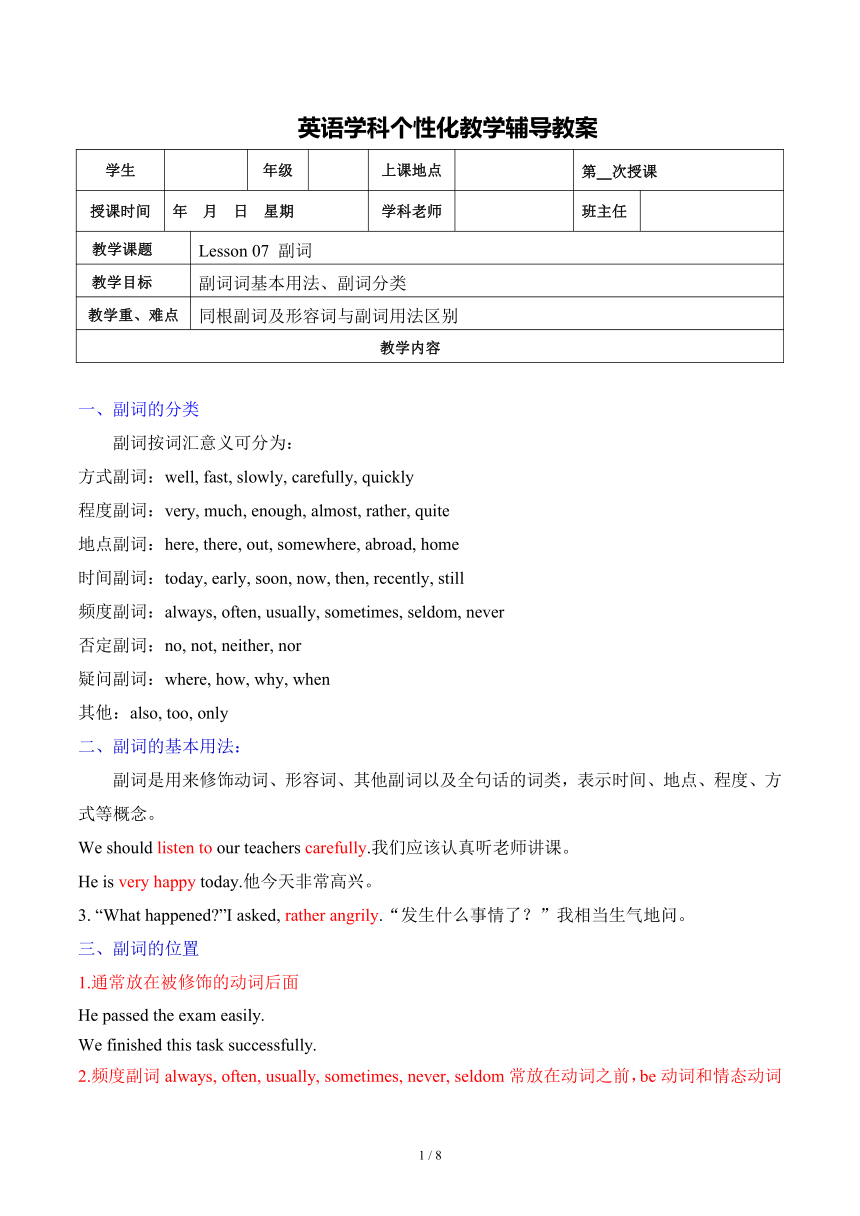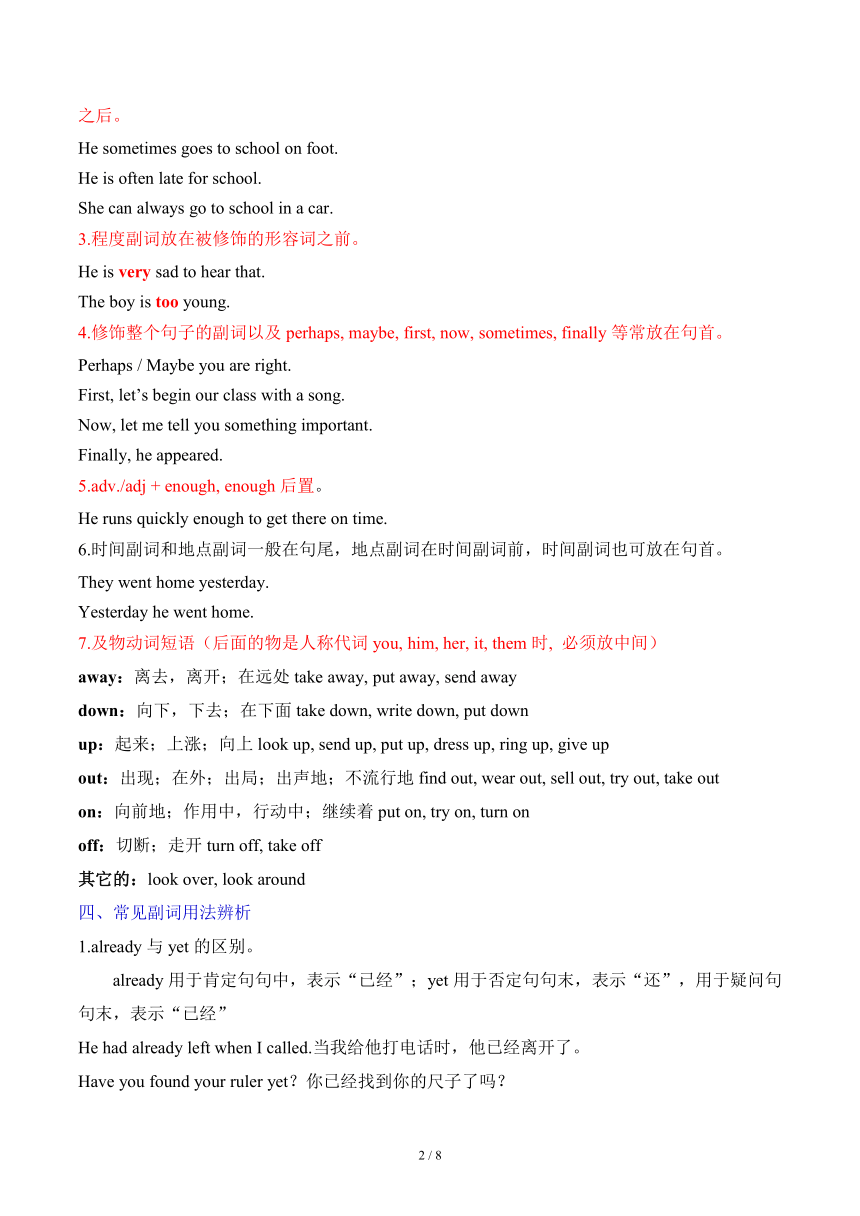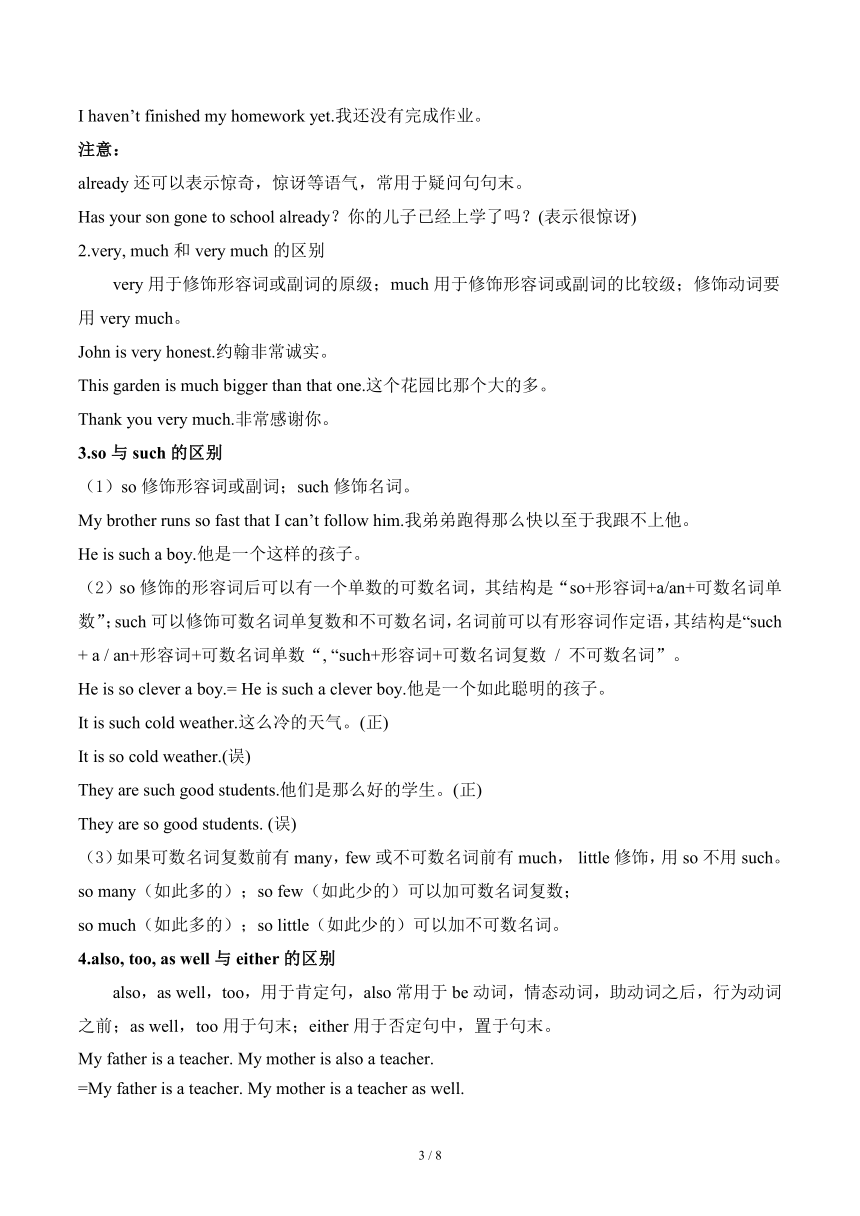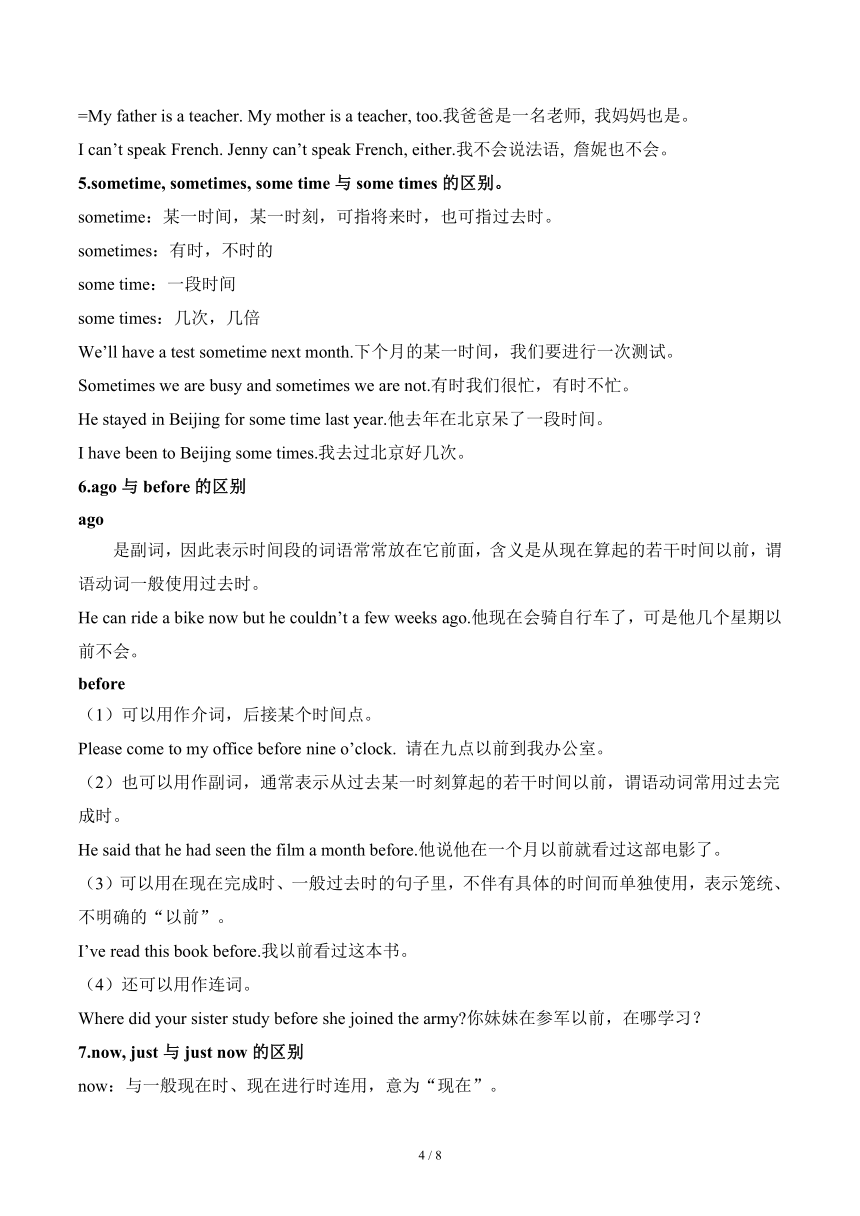2022年中考英语语法专题-第07讲副词
文档属性
| 名称 | 2022年中考英语语法专题-第07讲副词 |

|
|
| 格式 | docx | ||
| 文件大小 | 35.9KB | ||
| 资源类型 | 教案 | ||
| 版本资源 | 通用版 | ||
| 科目 | 英语 | ||
| 更新时间 | 2022-01-19 19:18:13 | ||
图片预览




文档简介
英语学科个性化教学辅导教案
学生 年级 上课地点 第 次授课
授课时间 年 月 日 星期 学科老师 班主任
教学课题 Lesson 07 副词
教学目标 副词词基本用法、副词分类
教学重、难点 同根副词及形容词与副词用法区别
教学内容
一、副词的分类
副词按词汇意义可分为:
方式副词:well, fast, slowly, carefully, quickly
程度副词:very, much, enough, almost, rather, quite
地点副词:here, there, out, somewhere, abroad, home
时间副词:today, early, soon, now, then, recently, still
频度副词:always, often, usually, sometimes, seldom, never
否定副词:no, not, neither, nor
疑问副词:where, how, why, when
其他:also, too, only
二、副词的基本用法:
副词是用来修饰动词、形容词、其他副词以及全句话的词类,表示时间、地点、程度、方式等概念。
We should listen to our teachers carefully.我们应该认真听老师讲课。
He is very happy today.他今天非常高兴。
3. “What happened ”I asked, rather angrily.“发生什么事情了?”我相当生气地问。
三、副词的位置
1.通常放在被修饰的动词后面
He passed the exam easily.
We finished this task successfully.
2.频度副词always, often, usually, sometimes, never, seldom常放在动词之前,be动词和情态动词之后。
He sometimes goes to school on foot.
He is often late for school.
She can always go to school in a car.
3.程度副词放在被修饰的形容词之前。
He is very sad to hear that.
The boy is too young.
4.修饰整个句子的副词以及perhaps, maybe, first, now, sometimes, finally等常放在句首。
Perhaps / Maybe you are right.
First, let’s begin our class with a song.
Now, let me tell you something important.
Finally, he appeared.
5.adv./adj + enough, enough后置。
He runs quickly enough to get there on time.
6.时间副词和地点副词一般在句尾,地点副词在时间副词前,时间副词也可放在句首。
They went home yesterday.
Yesterday he went home.
7.及物动词短语(后面的物是人称代词you, him, her, it, them时, 必须放中间)
away:离去,离开;在远处take away, put away, send away
down:向下,下去;在下面take down, write down, put down
up:起来;上涨;向上look up, send up, put up, dress up, ring up, give up
out:出现;在外;出局;出声地;不流行地find out, wear out, sell out, try out, take out
on:向前地;作用中,行动中;继续着put on, try on, turn on
off:切断;走开turn off, take off
其它的:look over, look around
四、常见副词用法辨析
1.already与yet的区别。
already用于肯定句句中,表示“已经”;yet用于否定句句末,表示“还”,用于疑问句句末,表示“已经”
He had already left when I called.当我给他打电话时,他已经离开了。
Have you found your ruler yet?你已经找到你的尺子了吗?
I haven’t finished my homework yet.我还没有完成作业。
注意:
already还可以表示惊奇,惊讶等语气,常用于疑问句句末。
Has your son gone to school already?你的儿子已经上学了吗?(表示很惊讶)
2.very, much和very much的区别
very用于修饰形容词或副词的原级;much用于修饰形容词或副词的比较级;修饰动词要用very much。
John is very honest.约翰非常诚实。
This garden is much bigger than that one.这个花园比那个大的多。
Thank you very much.非常感谢你。
3.so与such的区别
(1)so修饰形容词或副词;such修饰名词。
My brother runs so fast that I can’t follow him.我弟弟跑得那么快以至于我跟不上他。
He is such a boy.他是一个这样的孩子。
(2)so修饰的形容词后可以有一个单数的可数名词,其结构是“so+形容词+a/an+可数名词单数”;such可以修饰可数名词单复数和不可数名词,名词前可以有形容词作定语,其结构是“such + a / an+形容词+可数名词单数“, “such+形容词+可数名词复数 / 不可数名词”。
He is so clever a boy.= He is such a clever boy.他是一个如此聪明的孩子。
It is such cold weather.这么冷的天气。(正)
It is so cold weather.(误)
They are such good students.他们是那么好的学生。(正)
They are so good students. (误)
(3)如果可数名词复数前有many,few或不可数名词前有much, little修饰,用so不用such。
so many(如此多的);so few(如此少的)可以加可数名词复数;
so much(如此多的);so little(如此少的)可以加不可数名词。
4.also, too, as well与either的区别
also,as well,too,用于肯定句,also常用于be动词,情态动词,助动词之后,行为动词之前;as well,too用于句末;either用于否定句中,置于句末。
My father is a teacher. My mother is also a teacher.
=My father is a teacher. My mother is a teacher as well.
=My father is a teacher. My mother is a teacher, too.我爸爸是一名老师, 我妈妈也是。
I can’t speak French. Jenny can’t speak French, either.我不会说法语, 詹妮也不会。
5.sometime, sometimes, some time与some times的区别。
sometime:某一时间,某一时刻,可指将来时,也可指过去时。
sometimes:有时,不时的
some time:一段时间
some times:几次,几倍
We’ll have a test sometime next month.下个月的某一时间,我们要进行一次测试。
Sometimes we are busy and sometimes we are not.有时我们很忙,有时不忙。
He stayed in Beijing for some time last year.他去年在北京呆了一段时间。
I have been to Beijing some times.我去过北京好几次。
6.ago与before的区别
ago
是副词,因此表示时间段的词语常常放在它前面,含义是从现在算起的若干时间以前,谓语动词一般使用过去时。
He can ride a bike now but he couldn’t a few weeks ago.他现在会骑自行车了,可是他几个星期以前不会。
before
(1)可以用作介词,后接某个时间点。
Please come to my office before nine o’clock. 请在九点以前到我办公室。
(2)也可以用作副词,通常表示从过去某一时刻算起的若干时间以前,谓语动词常用过去完成时。
He said that he had seen the film a month before.他说他在一个月以前就看过这部电影了。
(3)可以用在现在完成时、一般过去时的句子里,不伴有具体的时间而单独使用,表示笼统、不明确的“以前”。
I’ve read this book before.我以前看过这本书。
(4)还可以用作连词。
Where did your sister study before she joined the army 你妹妹在参军以前,在哪学习?
7.now, just与just now的区别
now:与一般现在时、现在进行时连用,意为“现在”。
just:与现在完成时、过去完成时连用,表示“刚……”。
just now:和过去时连用,表示“刚才”。
Where does he live now?他现在住哪里?
We have just seen the film.我们刚看过这场电影。
He was here just now.他刚才在这里。
8. fairly → quite → rather / pretty → very
(1)这几个词都可表示程度,但语气的轻重不同,大致可描述如下(后面的词比前面的语气强):fairly → quite →rather / pretty → very。
(2)只有rather一词能和比较级及too连用,fairly, quite, pretty却不能。
rather warmer, rather too sure(有点太自信),quite可用在better前,指病完全好了。
(3)quite和rather都可以用在冠词前,也可和动词连用,pretty和fairly则不能。
quite a good film, rather a good idea
I quite like her.
I rather enjoy doing nothing.
(4)quite, fairly,和rather也可放在a/an后,但名词前必须有形容词时。如:a quite good film, a fairly interesting lecture, a rather good idea。
(5)一些“没有程度差别”的词,如:perfect, impossible, dead, right, wrong, ready, full, empty, alone, unique不能和fairly, rather, pretty连用,但可以和quite连用,表示completely或absolutely (完全)的意思。如:quite exhausted(精疲力尽), quite perfect(好极了)。
(6)可以说:It’s quite the same. 但不能说:It’s not quite the same.
五、同根副词
1.副词原形和加ly意义有区别的
(1)hard / hardly
Work hard, and you’ll succeed in time. (努力地)
His father could hardly believe it was true.(几乎不)
(2)late / lately
Dick got up late last Tuesday.
His husband has finished writing a new book lately.(近来)
(3)pretty / prettily
She speaks English pretty well. (非常,相当地)
Jane dressed prettily for the palace ball.(得体地, 漂亮地)
2.意思区别相近的,分别表示具体跟抽象的意思。
(1)close与closely
close是“近”;closely是“仔细地“密切地”。
He is sitting close to me.他就坐在我边上。
Watch him closely.盯着他。
(2)high / highly
They held their heads high.(高高地)
I have always thought very highly of him.(高度地)
(3)deep / deeply
They dug deep for the treasure.(深地)
He was deeply hurt.(深深地)
(4)wide与widely
wide表示空间宽度;widely是“广泛地”
He opened the door wide.
English is widely used in the world.
(5)firm / firmly
If we stand firm, I am sure we shall be successful.(牢牢地)
We must firmly bear this in mind.(牢牢地)
六、形容词变副词
形容词变副词规律小结
规则变化
范围 变化规则 例词
大部分形容词 加ly careless → carelessly quiet → quietly different → differently
以le结尾的形容词
变le为ly possible → possibly terrible → terribly
comfortable → comfortably gentle → gently
simple → simply
以y结尾的形容词
变y为ily easy → easily angry → angrily
noisy → noisily happy → -happily
heavy → heavily healthy → healthily
不规则变化
本身既是形容词也是副词, 无需改变 fast → fast early → early high → high
hard → hard late → late far → far
wide → wide alone → alone
形容词和副词为完全不同的单词 good → well
需要去掉字母e的单词 true-truly
due-duly adv.适当地;充分地;按时地
虽然以ly结尾,但却是形容词,不能直接用来修饰动词 friendly lively lovely lonely
likely monthly
学生 年级 上课地点 第 次授课
授课时间 年 月 日 星期 学科老师 班主任
教学课题 Lesson 07 副词
教学目标 副词词基本用法、副词分类
教学重、难点 同根副词及形容词与副词用法区别
教学内容
一、副词的分类
副词按词汇意义可分为:
方式副词:well, fast, slowly, carefully, quickly
程度副词:very, much, enough, almost, rather, quite
地点副词:here, there, out, somewhere, abroad, home
时间副词:today, early, soon, now, then, recently, still
频度副词:always, often, usually, sometimes, seldom, never
否定副词:no, not, neither, nor
疑问副词:where, how, why, when
其他:also, too, only
二、副词的基本用法:
副词是用来修饰动词、形容词、其他副词以及全句话的词类,表示时间、地点、程度、方式等概念。
We should listen to our teachers carefully.我们应该认真听老师讲课。
He is very happy today.他今天非常高兴。
3. “What happened ”I asked, rather angrily.“发生什么事情了?”我相当生气地问。
三、副词的位置
1.通常放在被修饰的动词后面
He passed the exam easily.
We finished this task successfully.
2.频度副词always, often, usually, sometimes, never, seldom常放在动词之前,be动词和情态动词之后。
He sometimes goes to school on foot.
He is often late for school.
She can always go to school in a car.
3.程度副词放在被修饰的形容词之前。
He is very sad to hear that.
The boy is too young.
4.修饰整个句子的副词以及perhaps, maybe, first, now, sometimes, finally等常放在句首。
Perhaps / Maybe you are right.
First, let’s begin our class with a song.
Now, let me tell you something important.
Finally, he appeared.
5.adv./adj + enough, enough后置。
He runs quickly enough to get there on time.
6.时间副词和地点副词一般在句尾,地点副词在时间副词前,时间副词也可放在句首。
They went home yesterday.
Yesterday he went home.
7.及物动词短语(后面的物是人称代词you, him, her, it, them时, 必须放中间)
away:离去,离开;在远处take away, put away, send away
down:向下,下去;在下面take down, write down, put down
up:起来;上涨;向上look up, send up, put up, dress up, ring up, give up
out:出现;在外;出局;出声地;不流行地find out, wear out, sell out, try out, take out
on:向前地;作用中,行动中;继续着put on, try on, turn on
off:切断;走开turn off, take off
其它的:look over, look around
四、常见副词用法辨析
1.already与yet的区别。
already用于肯定句句中,表示“已经”;yet用于否定句句末,表示“还”,用于疑问句句末,表示“已经”
He had already left when I called.当我给他打电话时,他已经离开了。
Have you found your ruler yet?你已经找到你的尺子了吗?
I haven’t finished my homework yet.我还没有完成作业。
注意:
already还可以表示惊奇,惊讶等语气,常用于疑问句句末。
Has your son gone to school already?你的儿子已经上学了吗?(表示很惊讶)
2.very, much和very much的区别
very用于修饰形容词或副词的原级;much用于修饰形容词或副词的比较级;修饰动词要用very much。
John is very honest.约翰非常诚实。
This garden is much bigger than that one.这个花园比那个大的多。
Thank you very much.非常感谢你。
3.so与such的区别
(1)so修饰形容词或副词;such修饰名词。
My brother runs so fast that I can’t follow him.我弟弟跑得那么快以至于我跟不上他。
He is such a boy.他是一个这样的孩子。
(2)so修饰的形容词后可以有一个单数的可数名词,其结构是“so+形容词+a/an+可数名词单数”;such可以修饰可数名词单复数和不可数名词,名词前可以有形容词作定语,其结构是“such + a / an+形容词+可数名词单数“, “such+形容词+可数名词复数 / 不可数名词”。
He is so clever a boy.= He is such a clever boy.他是一个如此聪明的孩子。
It is such cold weather.这么冷的天气。(正)
It is so cold weather.(误)
They are such good students.他们是那么好的学生。(正)
They are so good students. (误)
(3)如果可数名词复数前有many,few或不可数名词前有much, little修饰,用so不用such。
so many(如此多的);so few(如此少的)可以加可数名词复数;
so much(如此多的);so little(如此少的)可以加不可数名词。
4.also, too, as well与either的区别
also,as well,too,用于肯定句,also常用于be动词,情态动词,助动词之后,行为动词之前;as well,too用于句末;either用于否定句中,置于句末。
My father is a teacher. My mother is also a teacher.
=My father is a teacher. My mother is a teacher as well.
=My father is a teacher. My mother is a teacher, too.我爸爸是一名老师, 我妈妈也是。
I can’t speak French. Jenny can’t speak French, either.我不会说法语, 詹妮也不会。
5.sometime, sometimes, some time与some times的区别。
sometime:某一时间,某一时刻,可指将来时,也可指过去时。
sometimes:有时,不时的
some time:一段时间
some times:几次,几倍
We’ll have a test sometime next month.下个月的某一时间,我们要进行一次测试。
Sometimes we are busy and sometimes we are not.有时我们很忙,有时不忙。
He stayed in Beijing for some time last year.他去年在北京呆了一段时间。
I have been to Beijing some times.我去过北京好几次。
6.ago与before的区别
ago
是副词,因此表示时间段的词语常常放在它前面,含义是从现在算起的若干时间以前,谓语动词一般使用过去时。
He can ride a bike now but he couldn’t a few weeks ago.他现在会骑自行车了,可是他几个星期以前不会。
before
(1)可以用作介词,后接某个时间点。
Please come to my office before nine o’clock. 请在九点以前到我办公室。
(2)也可以用作副词,通常表示从过去某一时刻算起的若干时间以前,谓语动词常用过去完成时。
He said that he had seen the film a month before.他说他在一个月以前就看过这部电影了。
(3)可以用在现在完成时、一般过去时的句子里,不伴有具体的时间而单独使用,表示笼统、不明确的“以前”。
I’ve read this book before.我以前看过这本书。
(4)还可以用作连词。
Where did your sister study before she joined the army 你妹妹在参军以前,在哪学习?
7.now, just与just now的区别
now:与一般现在时、现在进行时连用,意为“现在”。
just:与现在完成时、过去完成时连用,表示“刚……”。
just now:和过去时连用,表示“刚才”。
Where does he live now?他现在住哪里?
We have just seen the film.我们刚看过这场电影。
He was here just now.他刚才在这里。
8. fairly → quite → rather / pretty → very
(1)这几个词都可表示程度,但语气的轻重不同,大致可描述如下(后面的词比前面的语气强):fairly → quite →rather / pretty → very。
(2)只有rather一词能和比较级及too连用,fairly, quite, pretty却不能。
rather warmer, rather too sure(有点太自信),quite可用在better前,指病完全好了。
(3)quite和rather都可以用在冠词前,也可和动词连用,pretty和fairly则不能。
quite a good film, rather a good idea
I quite like her.
I rather enjoy doing nothing.
(4)quite, fairly,和rather也可放在a/an后,但名词前必须有形容词时。如:a quite good film, a fairly interesting lecture, a rather good idea。
(5)一些“没有程度差别”的词,如:perfect, impossible, dead, right, wrong, ready, full, empty, alone, unique不能和fairly, rather, pretty连用,但可以和quite连用,表示completely或absolutely (完全)的意思。如:quite exhausted(精疲力尽), quite perfect(好极了)。
(6)可以说:It’s quite the same. 但不能说:It’s not quite the same.
五、同根副词
1.副词原形和加ly意义有区别的
(1)hard / hardly
Work hard, and you’ll succeed in time. (努力地)
His father could hardly believe it was true.(几乎不)
(2)late / lately
Dick got up late last Tuesday.
His husband has finished writing a new book lately.(近来)
(3)pretty / prettily
She speaks English pretty well. (非常,相当地)
Jane dressed prettily for the palace ball.(得体地, 漂亮地)
2.意思区别相近的,分别表示具体跟抽象的意思。
(1)close与closely
close是“近”;closely是“仔细地“密切地”。
He is sitting close to me.他就坐在我边上。
Watch him closely.盯着他。
(2)high / highly
They held their heads high.(高高地)
I have always thought very highly of him.(高度地)
(3)deep / deeply
They dug deep for the treasure.(深地)
He was deeply hurt.(深深地)
(4)wide与widely
wide表示空间宽度;widely是“广泛地”
He opened the door wide.
English is widely used in the world.
(5)firm / firmly
If we stand firm, I am sure we shall be successful.(牢牢地)
We must firmly bear this in mind.(牢牢地)
六、形容词变副词
形容词变副词规律小结
规则变化
范围 变化规则 例词
大部分形容词 加ly careless → carelessly quiet → quietly different → differently
以le结尾的形容词
变le为ly possible → possibly terrible → terribly
comfortable → comfortably gentle → gently
simple → simply
以y结尾的形容词
变y为ily easy → easily angry → angrily
noisy → noisily happy → -happily
heavy → heavily healthy → healthily
不规则变化
本身既是形容词也是副词, 无需改变 fast → fast early → early high → high
hard → hard late → late far → far
wide → wide alone → alone
形容词和副词为完全不同的单词 good → well
需要去掉字母e的单词 true-truly
due-duly adv.适当地;充分地;按时地
虽然以ly结尾,但却是形容词,不能直接用来修饰动词 friendly lively lovely lonely
likely monthly
同课章节目录
- 词法
- 名词
- 动词和动词短语
- 动词语态
- 动词时态
- 助动词和情态动词
- 非谓语动词
- 冠词
- 代词
- 数词和量词
- 形容词副词及其比较等级
- 介词和介词短语
- 连词和感叹词
- 构词法
- 相似、相近词比较
- 句法
- 陈述句
- 一般疑问句和否定疑问句
- 特殊疑问句及选择疑问句
- 反意疑问句
- 存在句(There be句型)
- 宾语从句
- 定语从句
- 状语从句
- 主谓一致问题
- 简单句
- 并列句
- 复合句
- 主谓一致
- 主、表语从句
- 名词性从句
- 直接引语和间接引语
- 虚拟语气
- 感叹句
- 强调句
- 倒装句
- 祈使句
- 句子的成分
- 句子的分类
- 题型专区
- 单项选择部分
- 易错题
- 完形填空
- 阅读理解
- 词汇练习
- 听说训练
- 句型转换
- 补全对话
- 短文改错
- 翻译
- 书面表达
- 任务型阅读
- 语法填空
- 其他资料
